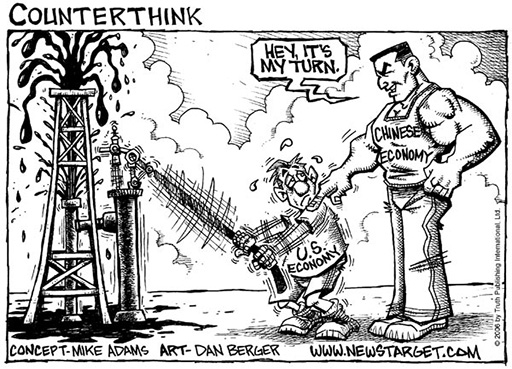2.1 Business-minded China
In many ways, China’s approach is more business minded, one which sees the Chinese state supporting its firms in accessing resources and markets, often backed by lending from China’s banks. This approach has been termed mercantilist because the Chinese state encourages and incentivises its large firms to enter these markets. In terms of China accessing natural resources in Africa, there have been numerous deals, such as with the Democratic Republic of Congo and Zambia. For oil, China’s main interests have been in the Sudan/s (which will be discussed in Session 4), Angola, Algeria, Libya and Nigeria. The reaction of Western countries to Chinese mercantilism has largely been alarmist – that the Chinese are muscling in on markets in ‘unfair’ ways.

These supposedly unfair ways include using aid to soften up leaders, turning a blind eye to authoritarianism, using tied bank loans, and overlooking labour and environmental standards. The Chinese have come into global oil at a time when major oil fields have been taken by the leading Western international oil companies (or IOCs) such as Shell, BP and ExxonMobil. As a result the Chinese National Oil Companies have to take what they can and this often means dealing with countries whose political systems are questionable. It is not that the ‘Communist’ Chinese prefer unaccountable states, but rather this is all they have access to. In reality Chinese firms want stability and manageable risks, and are increasingly joint-venturing with Western firms and African national oil companies. Watch Giles Mohan summarise Chinese interests.

Transcript: Video 3
Activity 1 Reactions to China’s global rise
China’s global rise has been greeted by some with alarm. Why might there be alarmist reactions from the West to China entering Africa?
Spend 10 minutes noting down three possible reactions and the reasons underpinning them.
Answer
There is no ‘correct’ answer to this activity, but here are some of the reasons that have circulated over the past 20 years or so. There are also some of the counter-arguments.
Responses
The Chinese deal with dictatorsuncritically and so perpetuate insecurity, persecution and lack of human rights. But, equally, Western companies have dealt with authoritarian leaders without too many qualms. Also, in the oil sector the older fields are already sewn up by the IOCs so China has had to take what it can get, which means dealing with some less democratic states.
The Chinese exploit African economies and extract both commodities and profits without giving much back. Likewise many Western companies have exploited Africa.
The Chinese ignore labour, environmental and other standards which is not only inherently damaging to the people and planet, but gives the Chinese unfair commercial advantages compared to other firms. There is truth in this to some degree, but some Western firms have also been lax over such standards.
The Chinese are taking over spheres of influence that have been under the direct and indirect control of Western powers for the last few centuries. This is true, but it raises the question of whether any external power should seek to dominate another country or region.
The Chinese Communist system is anti-democratic and so goes against ‘good’ political systems, such as those developed in the West. The Chinese system has become less open of late and this is worrying. But other states have also become more authoritarian and Western democracies are also not always worthy of emulation. Political voice has to be continually fought for and all countries are capable of moving along a scale of more or less openness.
The Chinese are untrustworthy and, despite what they say about caring for African development, we can’t always believe them. This is a very long-standing racial stereotype perpetrated in the West as a way of denigrating the Chinese, without any basis in truth.
Discussion
Possibly the most concering thing running through these responses is that we are saying that the Chinese are ‘no worse’ than many Western powers who have intervened (some would say interfered) in Africa. The point is that Africa has consistently been treated as a supplier of raw materials to be exported for other countries’ industrial development and this has stilted the continent’s development.
The remainder of the course will address the realities on the ground as to what are the impacts of China’s expansion into Africa for the continent’s development. You start by looking at the transitions in China’s political and economic life that have led to the rising demand for African resources.
